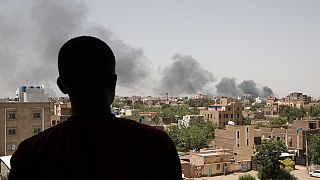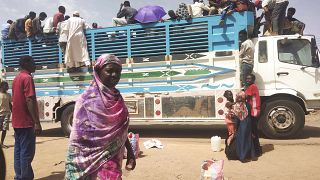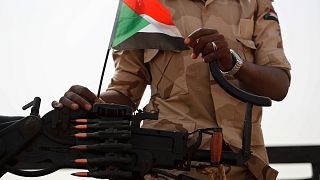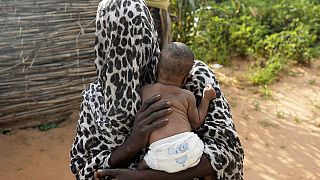Sudan
The war in Sudan that began a year ago between the country’s military, chaired by Gen. Abdel-Fattah Burhan, and the notorious Rapid Support Forces, commanded by Gen. Mohammed Hamdan Dagalo will mark one year on Monday.
The war in the African country has killed thousands and forced eight million people to flee their homes to safer areas inside Sudan or to neighbouring countries, according to United Nations figures.
But the precarious conditions and lack of aid is pushing Sudan to the edge of famine.
The food security situation has become the "biggest concern" for humanitarian agencies working in Sudan, according to Justin Brady, the Head of the OCHA office in the country.
In an interview, he said this year’s harvest season was at least 4% less than that of last year, adding that last month they received two credible warnings of famine in the country.
“Famine isn't a word that we as humanitarians use loosely. It's something that is reserved, really, for the direst situations. And I'm afraid that's where the Sudanese people find themselves,” he said.
The international community’s authority on determining the severity of hunger crises warned last month that an immediate action is needed to “prevent widespread death and total collapse of livelihoods and avert a catastrophic hunger crisis in Sudan.”
The Integrated Food Security Phase Classification, or IPC, said that security conditions and lack of access meant the agency was unable to update its assessment from December, when it found 17.7 million people in Sudan were facing acute food insecurity; of them about 5 million being one step from famine.
Brady said they received reports of people dying of malnutrition, and others eating leaves of trees, or only eating once in three days.
He described the humanitarian situation in Sudan as “very dark,” adding that “this is going to get very ugly very quickly, we can overcome both the resource challenges and the access challenges.”
He appealed to the international community to pressure the warring parties to stop fighting, raise funds for the U.N. response plan - which is only 5% funded for this year - and allow access to the worst hit areas in Khartoum, Darfur and Kordofan region to help reverse the course of the disaster before it’s too late.
“We’re not just talking about people potentially dying in the tens and hundreds of thousands in the coming weeks and months. But it is really delirious, depleting effect on Sudan for the future,” he said.
Since the war began, food production has crashed, imports stalled and staple food prices have soared by 45% in less than a year, according to The United Nations Office for the Coordination of Humanitarian Affairs, OCHA.
Movement of food across the country, particularly to rural and remote areas where most people live, has also been severely restricted due to conflict, driving more than 37% of the population into above crisis levels of hunger, the OCHA said in a recent report.
Eighteen months before the war, both Burhan and Dagalo led a military coup and plunged the country into chaos.
They toppled an internationally recognised civilian government that was supposed to steer the country’s democratic transition after the 2019 military overthrow of longtime dictator Omar al-Bashir amid a popular uprising against his three-decade of Islamist-backed rule.
The coup and the war were a major blow to Sudanese’s hopes for a democratic rule after decades of military and Islamist rule that turned Sudan into a pariah state for decades.
United Nations experts said in a report to the U.N. Security Council earlier this year that Darfur is experiencing “its worst violence since 2005.”












Go to video
ICC warns of a dire humanitarian crisis in Sudan as the war rages on
01:25
MSF: Access to healthcare in Sudan 'almost impossible' as attacks on healthcare facilities increase
01:05
Ethiopia's mega-dam on the Nile is "now complete", Prime Minister says
01:09
Sudan: RSF paramilitaries and allies declare parallel government
01:49
Sudanese refugees in Chad face deepening humanitarian crisis
01:11
Sudan: U.S. sanctions over alleged chemical weapons use come into force